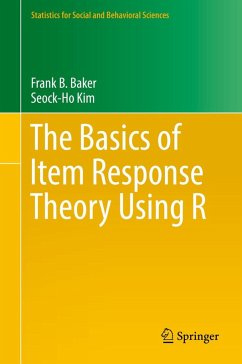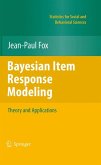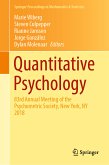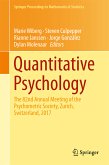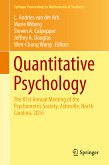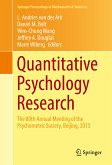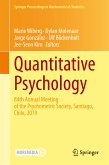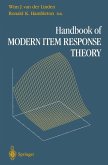This graduate-level textbook is a tutorial for item response theory that covers both the basics of item response theory and the use of R for preparing graphical presentation in writings about the theory. Item response theory has become one of the most powerful tools used in test construction, yet one of the barriers to learning and applying it is the considerable amount of sophisticated computational effort required to illustrate even the simplest concepts. This text provides the reader access to the basic concepts of item response theory freed of the tedious underlying calculations. It is intended for those who possess limited knowledge of educational measurement and psychometrics.
Rather than presenting the full scope of item response theory, this textbook is concise and practical and presents basic concepts without becoming enmeshed in underlying mathematical and computational complexities. Clearly written text and succinct R code allow anyone familiar with statistical concepts to explore and apply item response theory in a practical way. In addition to students of educational measurement, this text will be valuable to measurement specialists working in testing programs at any level and who need an understanding of item response theory in order to evaluate its potential in their settings.
- Combines clearly written text and succinct R code
- Utilizes a building-block approach from simple to complex, enabling readers to develop a clinical feel for item response theory and how its concepts are interrelated
- Includes downloadable R functions that implement various facets of item response theory
Frank B. Baker, Ph.D., is Professor Emeritus of the Department of Educational Psychology at the University of Wisconsin-Madison. He is author of numerous publications dealing with item response theory and statistical methodology. He received his B.S., M.S.,and Ph.D. degrees from the University of Minnesota, Minneapolis.
Seock-Ho Kim, Ph.D., is Professor in the Department of Educational Psychology at the University of Georgia. He is author of numerous publications in psychometrics and applied statistics and is a member of the American Educational Research Association, the American Statistical Association, the National Council on Measurement in Education, and the Psychometric Society, among other organizations. He received his B.A. from Korea University and his M.S. and Ph.D. degrees from the University of Wisconsin-Madison.
Dieser Download kann aus rechtlichen Gründen nur mit Rechnungsadresse in A, B, BG, CY, CZ, D, DK, EW, E, FIN, F, GR, HR, H, IRL, I, LT, L, LR, M, NL, PL, P, R, S, SLO, SK ausgeliefert werden.
Hinweis: Dieser Artikel kann nur an eine deutsche Lieferadresse ausgeliefert werden.
Es gelten unsere Allgemeinen Geschäftsbedingungen: www.buecher.de/agb
Impressum
www.buecher.de ist ein Internetauftritt der buecher.de internetstores GmbH
Geschäftsführung: Monica Sawhney | Roland Kölbl | Günter Hilger
Sitz der Gesellschaft: Batheyer Straße 115 - 117, 58099 Hagen
Postanschrift: Bürgermeister-Wegele-Str. 12, 86167 Augsburg
Amtsgericht Hagen HRB 13257
Steuernummer: 321/5800/1497
USt-IdNr: DE450055826
Bitte wählen Sie Ihr Anliegen aus.
Rechnungen
Retourenschein anfordern
Bestellstatus
Storno

